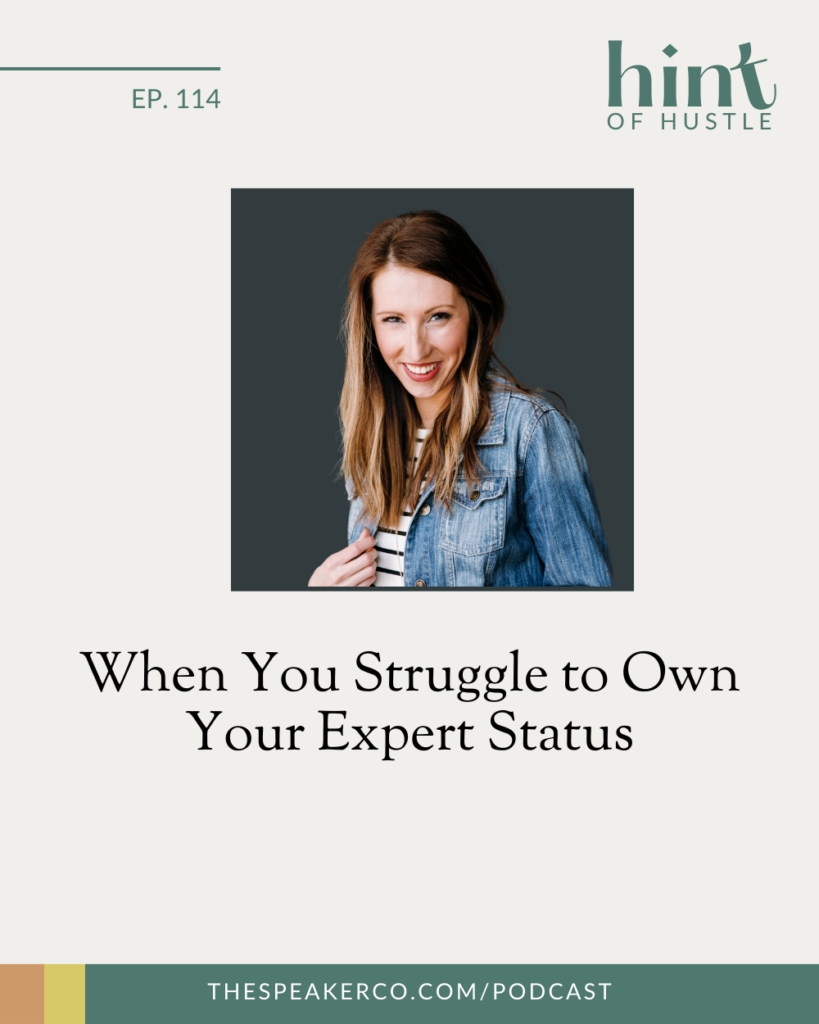
Subscribe to Heather’s YouTube Channel here.
A lot of times as we’re growing in our businesses or in our careers, we have a tendency to shy Have you ever felt uncomfortable calling yourself an “expert”? On one hand, you have incredible experience and knowledge with your topic, but on the other, it feels there are so many more people who are qualified. Leaving you with the question, who am I to…
…speak on that stage.
… Post that video.
… Create that program.
… call myself an expert.
It’s likely you’ve felt this before. You know that you have a great deal of expertise and know that your experience is valuable that it can help and teach others, BUT you still second guess yourself at almost every turn.
So the question is, do true “experts” feel this way? Is it possible to own your authority AND feel like you’re not qualified enough?
We dive into this today in a real, unscripted conversation where I share my perspective on why calling yourself an expert just doesn’t work, and more importantly, what you should do instead.
Inside this episode you’ll learn:
- The problem with “experts”
- At what point can you actually call yourself one?
- 3 Specific things to think about when you struggle to your own expert status
Episode Show Notes
The Problem with “Experts”
If you’re anything like me, you hate the word expert. Justin Bariso, author of this incredible article I found in LinkedIn hit my sentiment on this and explains specifically why. It says, “LinkedIn 101: Please Stop Calling Yourself an Expert. Instead, Just Do This.” He talks about this idea of why you shouldn’t be calling yourself as an expert and the rationale behind this. It’s not what you call yourself that matters but instead you have to demonstrate your expertise and allow other people to label you as the go-to authority.
When do you become an “expert”?
You’ll be the expert in how you show up but you need to stop focusing so much on trying to be one and figuring out what your title is. I know positioning is important, but at the end of the day, you have to ask yourself the question, how are other people describing you? Talk about more around what other people are saying about you versus you declaring how awesome you are.
Think about this in the context of your business. Let’s say you want to buy something online, where do you go to check and make the decision to evaluate which is the best one you should get? You go straight to the reviews, right? Because it doesn’t matter what’s in the description or what the company or the seller says about the product, what matters is what the people who have already purchased and are using it are saying. We want the reviews of other people, real customers, real people like us—that’s how we look to tell us if something is legit or not.
3 Specific Things to Think About When You Struggle to Your Own Expert Status
1. Own your expert status.
You have the expertise—recognize the things you know, the things you do that come naturally to you and do NOT come naturally to other people. You know your topic more than the average person does. You don’t have to call yourself an EXPERT, but you need to know that your expertise is unique and recognize that what you have to offer to each is VALUABLE. That’s what being an expert is.
2. A good teacher is a good learner.
The struggle that happens oftentimes in the online space where the guru or the mentor that we follow seems to know so much about everything and then we develop this thought that we too have to be a jack of all trades. But you do not need to know everything in order for you to really own how good you are in the things that you do.
You can be really good at your gifts of what you do and you can still be in learning mode with all the other things. You can be expert status and create incredible value and still be a hot mess in other areas of your life in business. In fact, you can actually suck at a lot of other things and that’s totally okay. Those two things can mutually exist.
3) Recognize the difference between humility and self sabotage.
We have a tendency to downplay our strengths and wear humility like a badge of honor but sometimes that humility is no longer humility. It is self sabotage. When you show up in a way that you are so humble that you poop on your own success and your own knowledge to the point where you’re actually sabotaging yourself.
Know that when it comes to business, it is not typically the person who knows the most is the most successful one. The value that you bring is your ability to take that knowledge and make it meaningful to other people. Instead of eroding your own confidence because of your inability to accept that you are awesome, why not start accepting the fact that you do know your thing and you can help and serve people.
Books / Resources mentioned in episode:
LinkedIn 101: Please Stop Calling Yourself an Expert. Instead, Just Do, Justin Bariso
Harvard Business Review: Why Women Don’t Apply for Jobs Unless They’re 100% Qualified